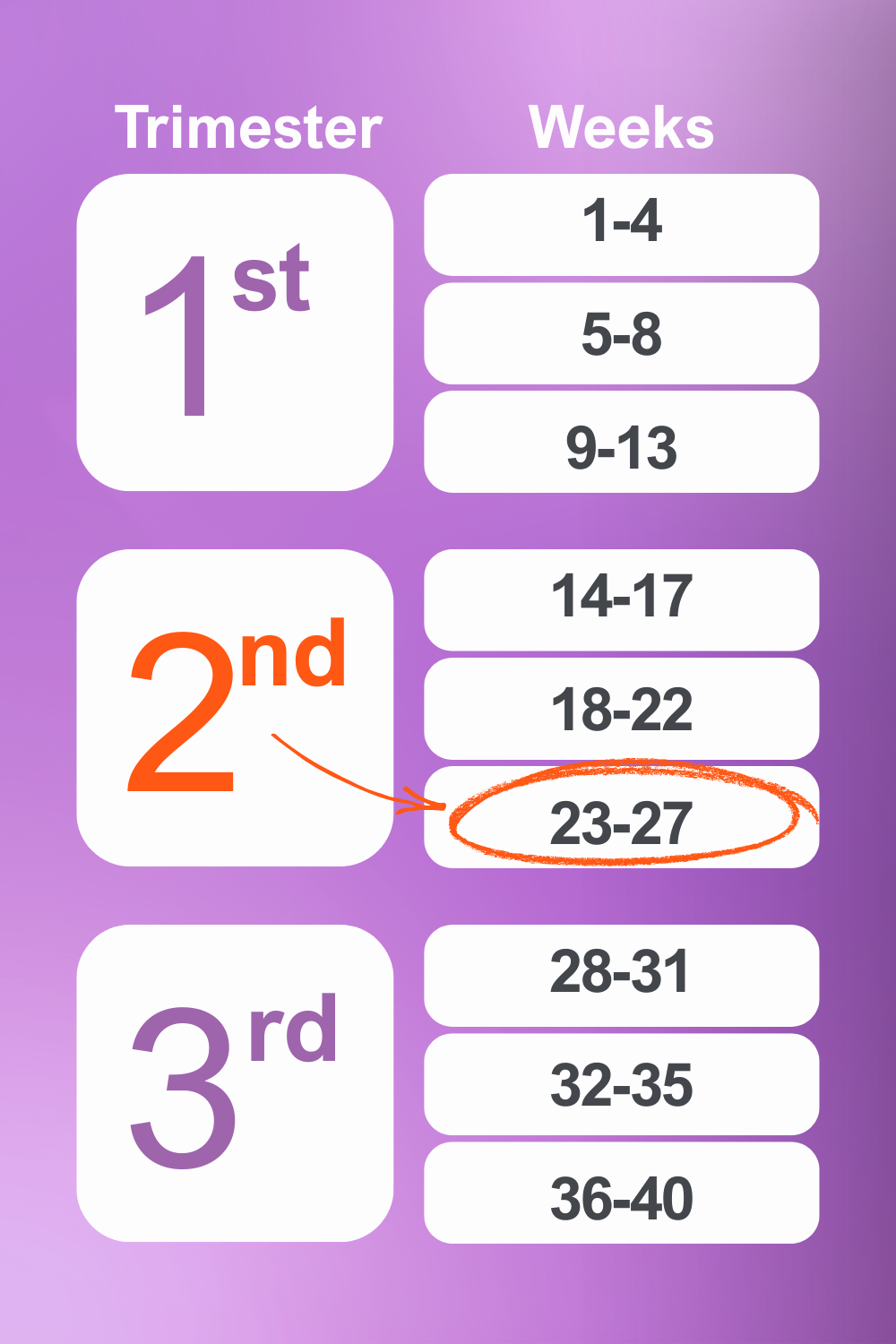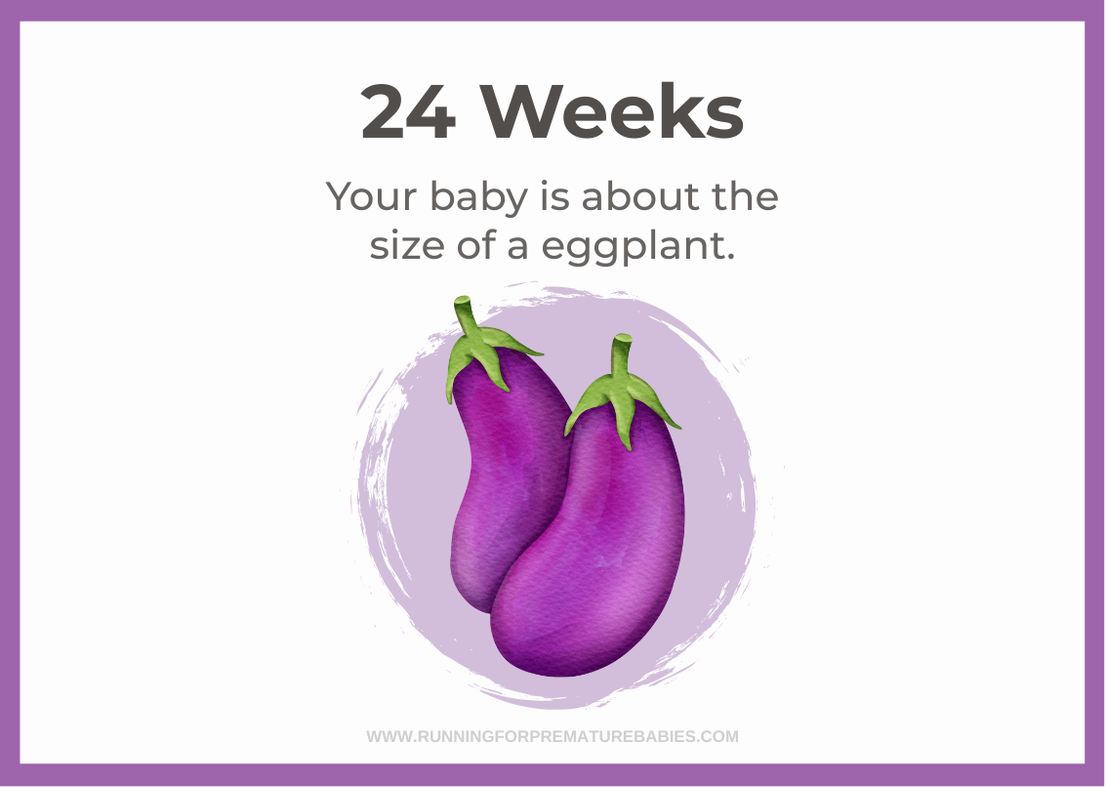Key Milestone Weeks in Pregnancy
Second Trimester

24 Weeks: Taste buds developed; lungs begin to develop; considered the threshold of viability for preterm birth in Australia.
Summary:
At 24 weeks pregnant, you're about six months along and entering a vital stage of your second trimester where your baby is growing rapidly and becoming more active. Your baby is developing senses like hearing and taste. Their lungs are forming, and you will likely feel regular movements and may notice Braxton Hicks contractions as your uterus practices for labour. At 24 weeks pregnant, your baby reaches the threshold of viability, meaning that with expert medical care in a neonatal intensive care unit (NICU), survival outside the womb becomes possible. Babies born at this stage have about a 50% chance of survival if delivered in hospital and given specialised care. However, they are at high risk of long-term complications such as cerebral palsy, blindness, or chronic lung disease due to the immaturity of their organs. Each week beyond 24 increases your baby’s survival chances and reduces the risk of long-term complications.
At 24 weeks pregnant, your body is well into the second trimester and undergoing noticeable changes to support your growing baby. Your uterus has expanded so that the top now sits just above your belly button. Many women notice more prominent veins in their legs and breasts due to increased blood flow and hormonal changes. Increased clear or white vaginal discharge is also common now as your body works to prevent infections. If it becomes green, yellow, or smells unusual, consult your healthcare provider.
You might also experience Braxton Hicks contractions, which are mild, irregular tightenings of the uterus as it prepares for labour. These changes are all part of your body’s natural adaptation to pregnancy and are signs that your baby is developing well. One important development around this stage is the consideration of maternal vaccinations, particularly for Respiratory Syncytial Virus (RSV). NSW Health recommends the Abrysvo® vaccine between 28-36 weeks to help protect newborns from RSV, a common and potentially serious respiratory illness. The vaccine helps your body produce antibodies that pass through the placenta to your baby, offering protection for the first six months after birth. Abrysvo® is free under the National Immunisation Program and can be safely given alongside other pregnancy vaccines like those for whooping cough and influenza.

At 24 weeks pregnant, your baby is reaching a major developmental milestone. At this point, your baby weighs around 600–700 grams and is about 30 cm long. Their lungs are developing and beginning to produce surfactant, a substance that helps them breathe after birth. Your baby’s taste buds are developed, and flavours from the foods you eat can reach the amniotic fluid, offering their first experiences with taste.
Babies born at this stage are considered extremely premature but may survive with intensive medical care in a Neonatal Intensive Care Unit (NICU). Breathing and feeding are difficult for babies born this early, and they often require respiratory support, nutritional assistance, and close monitoring.
See FAQs Below
Get Involved
Run with us
Donate
Join the Premmie Marathon Challenge
FAQs
What tests are offered at 24 weeks?
At 24 weeks pregnant, one of the most important routine tests offered is the Glucose Tolerance Test (GTT), which screens for gestational diabetes, a temporary form of diabetes that can develop during pregnancy. This test is typically done between 24-28 weeks, as this is when pregnancy hormones begin to interfere more significantly with insulin, potentially leading to elevated blood sugar levels.
The GTT involves a few steps:
- Fasting: You’ll be asked not to eat or drink (except water) for 8-10 hours before the test.
- Initial blood test: A sample is taken to measure your baseline blood glucose level.
- Glucose drink: You’ll then drink a sweet glucose solution.
- Follow-up blood tests: Your blood will be tested again at intervals (usually 1 and 2 hours after drinking) to see how your body processes the sugar.
Gestational diabetes doesn’t usually cause noticeable symptoms, which is why testing is important. If diagnosed, it can usually be managed with diet, exercise, and sometimes medication. Managing it well helps reduce the risk of complications such as high birth weight, preterm birth, and neonatal hypoglycaemia.
What symptoms are common at 24 weeks?
At 24 weeks pregnant, your body is undergoing many changes to support your growing baby, and it's common to experience a range of physical symptoms. Some of the most typical symptoms include:
- Tiredness and fatigue: Your body is working hard, and hormonal changes can leave you feeling more drained than usual.
- Headaches: Often caused by dehydration, hormonal shifts, or eye strain. If persistent or severe, they should be checked by a healthcare provider.
- Stretch marks and itchy skin: As your belly grows, the skin stretches, which can lead to itchiness and visible marks.
- Back pain: Due to softened ligaments and the weight of your uterus. Gentle exercise, hot packs, and good posture can help.
- Braxton Hicks contractions: These are mild, irregular tightenings of the uterus that may start around this time. They’re not labour contractions and usually ease with rest or a change in position.
- Round ligament pain: Sharp or aching pain on the sides of your abdomen caused by the stretching of ligaments supporting the uterus.
- Leg cramps: Often occurring at night, these can be relieved by stretching or walking.
- Heartburn and indigestion: Caused by hormonal changes and pressure from the uterus on your stomach.
- Frequent urination: The growing uterus presses on your bladder, increasing the need to go.
- Food cravings or aversions: Hormonal changes can trigger strong preferences or dislikes for certain foods.
These symptoms are usually normal, but if anything feels severe or unusual, it’s important to speak with your midwife or doctor.
What are Braxton Hicks contractions?
Braxton Hicks contractions are often described as your body's way of "practising" for labour. These are mild, irregular tightenings of the uterus that can begin around 24 weeks of pregnancy, though some people may notice them earlier or later. Unlike true labour contractions, Braxton Hicks are usually infrequent, non-rhythmic, and don’t increase in intensity. They often feel like a tightening or hardening of your belly and typically last for about 30 seconds to 2 minutes.
You might notice them more when you're tired, dehydrated, or have been physically active. They can also be triggered by things like a full bladder, sexual activity, or even just touching your belly. One of the key ways to tell them apart from real labour contractions is that Braxton Hicks usually ease off if you change position, rest, or drink water.
While they’re usually harmless, it’s important to contact your healthcare provider if the contractions become painful, regular, or are accompanied by other symptoms like bleeding, fluid leakage, or pelvic pressure, as these could be signs of preterm labour.
Related reading:
First Trimester
What to expect when you're 3-4 weeks pregnant
What to expect when you're 5 weeks pregnant
What to expect when you're 6-9 weeks pregnant
What to expect when you're 10 weeks pregnant
What to expect when you're 12 weeks pregnant
What to exprect when you're 14 weeks pregnant
Second Trimester
What to expect when you're 18 weeks pregnant
What to expect when you're 20 weeks pregnant
What to expect when you're 22-23 weeks pregnant
What to expect when you're 24 weeks pregnant
What to expect when you're 26-27 weeks pregnant
Third Trimester
What to expect when you're 28 weeks pregnant
What to expect when you're 29 weeks pregnant
What to expect when you're 30 weeks pregnant
What to expect when you're 32-33 weeks pregnant
What to expect when you're 34 weeks pregnant
What to expect when you're 36 weeks pregnant
What to expect when you're 37 weeks pregnant
What to expect when you're 38-40 weeks pregnant
If you would like to run with us, either in memory of a precious baby, to celebrate new life, or simply to add purpose to your fitness journey, click here to find out how you can help give babies a better chance of survival.
Pregnancy, Birth and Baby. (n.d.). Pregnancy at week 24. https://www.pregnancybirthbaby.org.au/pregnancy-at-week-24. Retrieved 15th August 2025
NSW Health. (n.d.). Kids and families. https://www.health.nsw.gov.au/kidsfamilies Retrieved 15th August 2025
NSW Health. (n.d.). Abrysvo – RSV vaccine for pregnant women. https://www.health.nsw.gov.au/immunisation/pages/abrysvo.aspx Retrieved 25th August 2025
Sydney Children's Hospitals Network. (n.d.). Child development: Premature babies. Kids Health Hub. https://www.schn.health.nsw.gov.au/kids-health-hub/child-development/child-development-premature-babies. Retrieved 15th August 2025
NSW Health Pathology. (n.d.). Glucose tolerance test (GTT). https://pathology.health.nsw.gov.au/test_information/glucose-tolerance-test Retrieved 15th August 2025


